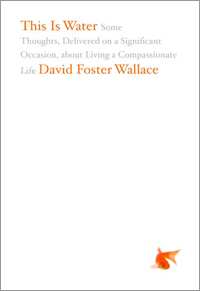Life Before Death

David Foster Wallace’s suicide last autumn sent shockwaves through the literary world unleashing a torrent of verbiage, opinionizing, and hand wringing—it seemed as if anyone who ever read a book weighed in on the sorrow, D.F.W.’s legacy, or somesuch. How to explain the reaction? Wallace’s relative youth (46 years)? His zealous protection of his privacy (Michael Pietsch, then the editor responsible for acquiring Infinite Jest, “David was extremely uncomfortable at anything having to do with success, power, competition, anyone sort of putting themselves forward”)? Some residual cultural memory of Infinite Jest being tagged as “the grunge American novel” by the New York Times Magazine (truly one of the silliest editorial gestures in my recall)? Certainly that book, his opus magnum, with more than 1,000 pages and 100 pages of endnotes, gained him fleeting pop/mainstream notice in the mid-’90s (one wonders how many people actually read it?) such as the above referred-to Times idiocy. Now in this season of college graduations, we are treated to This Is Water: Some Thoughts, Delivered on a Significant Occasion, About Living a Compassionate Life (Little, Brown), a slender volume containing Foster Wallace’s 2005 commencement oratory at Kenyon College. I inquired of Pietsch, now the publisher at Little, Brown about the circumstances of This Is Water’s publication. His response:
An editor at another house proposed making it a book to David’s agent. I had thought it was too short and intended to include it in an uncollected-works volume, but once we tried putting one sentence per page it worked wonderfully!
Wallace’s address in large part deals with the commonplace notion that the value of a college education was to teach one to think:
The point here is that I think this is one part of what teaching me how to think is really supposed to mean. To be just a little less arrogant. To have just a little critical awareness about myself and my certainties. Because a huge percentage of the stuff that I tend to be automatically certain of is, it turns out, totally wrong and deluded. I have learned this the hard way, as I predict you graduates will, too.
And then there is Wallace’s conviction concerning “true freedom”:
[It] means being conscious and aware enough to choose what you pay attention to and to choose how you construct meaning from experience. Because if you cannot exercise this kind of choice in adult life, you will be totally hosed.
(By the way, my colleagues here at The Morning News have sponsored an interesting initiative to encourage the reading of Infinite Jest.)
Apropos of nothing, here is David Foster Wallace on the publishing business:
And finally, The Pale King, Wallace’s unfinished novel discovered posthumously by his widow, is scheduled for publication next spring. Though I am generally opposed to this kind of fiddling around, in fairness I should withhold comment until I can read it, yes?
